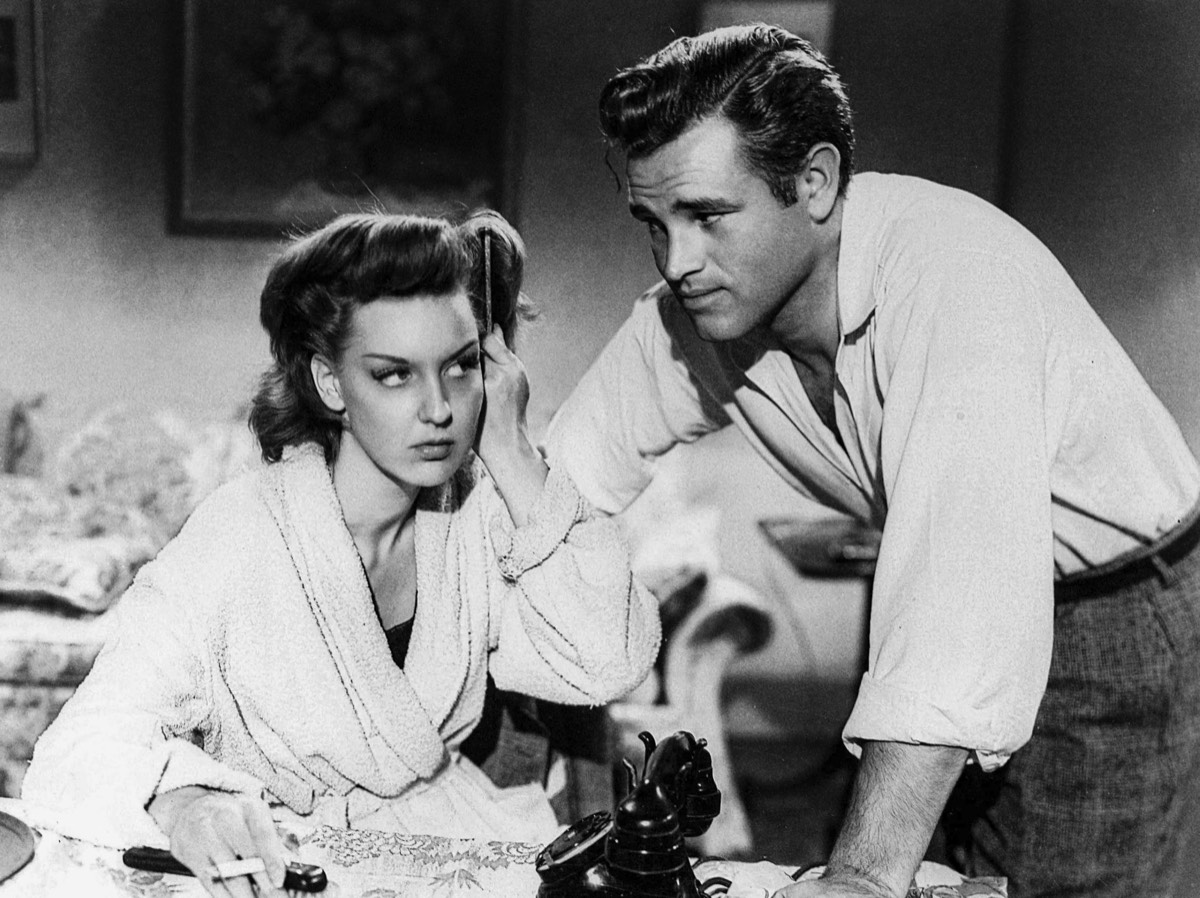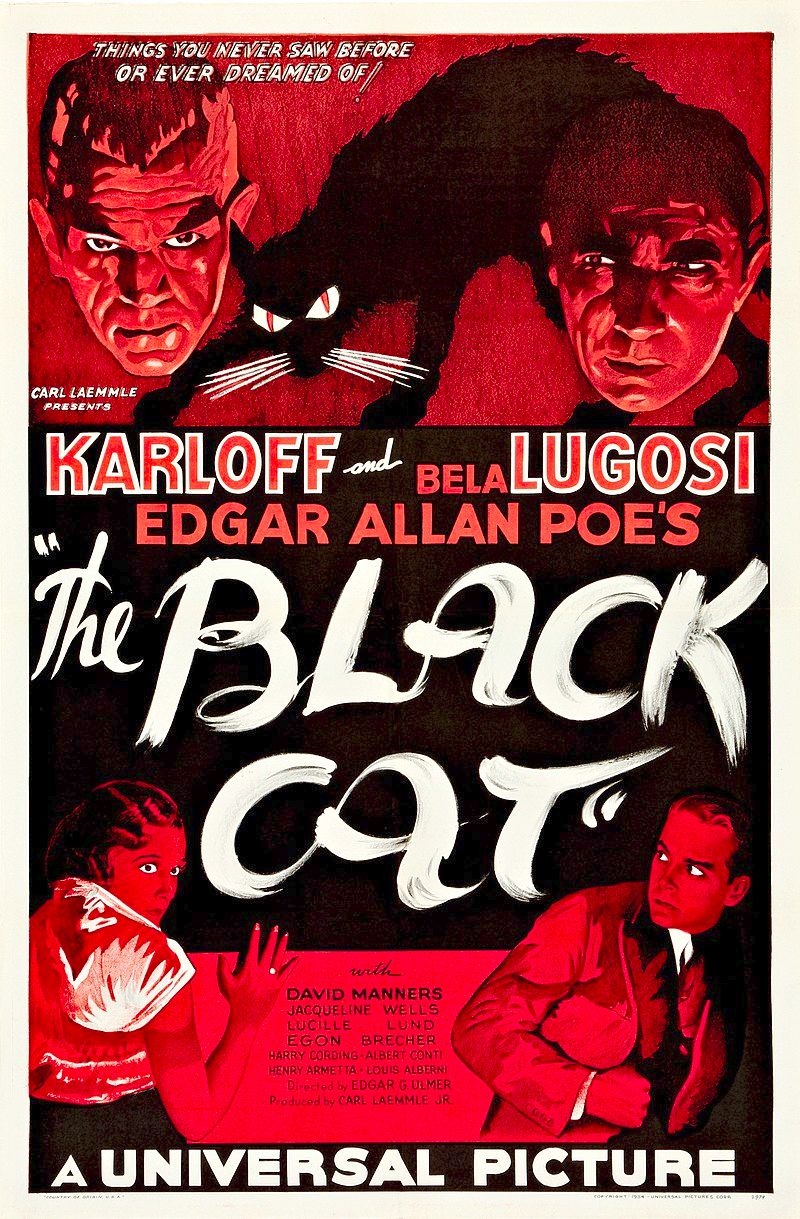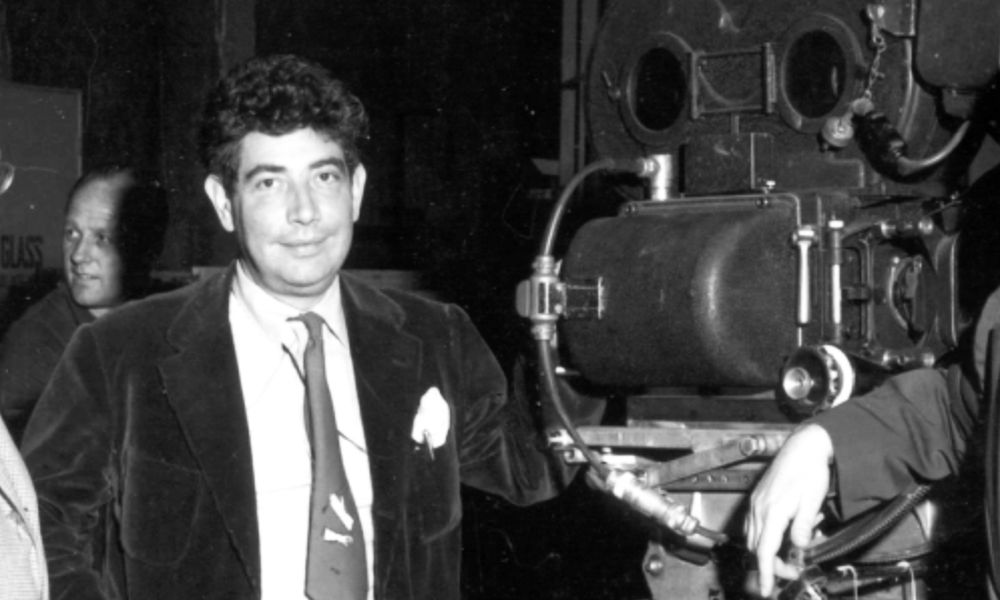"A director forced to work with an inordinate number of ridiculous scripts who, nonetheless, proved that a fluid camera and a foreboding visual style could make an artistic statement of even the worst vehicles Hollywood could offer… He contributed a surprising number of minor screen classics, including The Black Cat (1934), Bluebeard (1944), Detour (1946), and Ruthless (1948)." - The Encyclopedia of Hollywood, 2004
Edgar G. Ulmer
Director / Production Designer / Screenwriter / Producer
(1904-1972) Born September 17, Olmütz, Moravia, Austria-Hungary (now Olomouc, Czech Republic)
50 Key Noir Directors
(1904-1972) Born September 17, Olmütz, Moravia, Austria-Hungary (now Olomouc, Czech Republic)
50 Key Noir Directors
Key Production Country: USA
Key Genres: Drama, Crime, Film Noir, Mystery, Thriller, Science Fiction, Melodrama, Psychological Thriller
Key Collaborators: Leon Fromkess (Producer), Carl Pierson (Editor), Leo Erdody (Composer), Edward C. Jewell (Production Designer), Tom Neal (Leading Actor), Margaret Lindsay (Leading Actor), Louis Hayward (Leading Actor), Aubrey Wisberg (Producer/Screenwriter), Benjamin Kline (Cinematographer), Fred R. Feitshans Jr. (Editor), Regis Toomey (Leading Character Actor)
Key Genres: Drama, Crime, Film Noir, Mystery, Thriller, Science Fiction, Melodrama, Psychological Thriller
Key Collaborators: Leon Fromkess (Producer), Carl Pierson (Editor), Leo Erdody (Composer), Edward C. Jewell (Production Designer), Tom Neal (Leading Actor), Margaret Lindsay (Leading Actor), Louis Hayward (Leading Actor), Aubrey Wisberg (Producer/Screenwriter), Benjamin Kline (Cinematographer), Fred R. Feitshans Jr. (Editor), Regis Toomey (Leading Character Actor)
"The films of Edgar G. Ulmer have generally been classified as 'B' pictures. However, it might be more appropriate to reclassify some of these films as 'Z' pictures. On an average, Ulmer’s pictures were filmed on a six-day shooting schedule with budgets as small as $20,000. He often worked without a decent script, adequate sets, or convincing actors. But these hardships did not prevent Ulmer from creating an individual style within his films. Part of the look of Ulmer’s films was, naturally, a result of their meager budgets. The cast was kept to a minimum, the sets were few and simple, and stock footage helped to keep costs down (even when it did not quite match the rest of the film)." - Linda Obalil (The St. James Film Directors Encyclopedia, 1998)
"Of all the directors of shoestring movies made for Hollywood 'Poverty Row' studios, none is more revered today than Austrian-born Edgar G. Ulmer. How Ulmer failed to become one of the major directors of the screen is among the cinema's great mysteries, although, in a way, he helped to dig his own grave. He was so good at making commercial, well-reviewed, profitable films out of the small change in the producer's pocket that he became trapped in that field… His best films have an edge, a kind of intensity that carries them beyond the (severe) limitations of their budgets." - David Quinlan (Quinlan's Illustrated Guide to Film Directors, 1999)

Detour (1945)
"Ulmer was used to making the most of very little: though he began promisingly, assisting Murnau and collaborating with Siodmak, Wilder and Zinnemann on the classic People on Sunday, his move to Hollywood soon confined him to the industry's lower depths, often making ultra-cheap programme-fillers for ethnic minorities. But somehow he contrived to direct a number of genuinely impressive films, notable for their taut narratives, broodingly intense mood, and an expressive visual style in which he made imaginative use of long, fluid camera movements, looming shadows and - when the budget allowed - evocative sets (he'd worked as a designer in Germany)… Seldom has cinematic invention successfully transcended such impoverished resources." - Geoff Andrew (The Director's Vision, 1999)
"Some directors work on a shoestring; the prodigiously talented and resourceful Edgar G. Ulmer had to settle for the lint from the laces. Some of Ulmer's films were shot in less than a week for next to nothing. Yet, rather miraculously, he usually succeeded in putting a personal signature on movies made under extremely cramped conditions, in a wide variety of languages (Ukrainian, Yiddish, Spanish, Italian) and genres (science fiction, melodrama, crime, comedy, horror, musicals, historical epic)… On the fringes of Hollywood, Ulmer made in excess of one hundred low-budget films earning himself the title 'King of Poverty Row'… Ulmer's most revered work remains the benchmark noir film Detour (1945), a no-budget, no exit four-hander with a world-class case of the cold sweats." - Jessica Winter (The Rough Guide to Film, 2007)
"Throughout his career, Ulmer worked with minuscule budgets and often with impossible scripts, mostly at the service of Poverty Row studios in the US as well as in Mexico, Italy, and Spain. Some of his films were made for such obscure producers (including several Yiddish and Ukrainian productions) that an accurate and full chronology of his work is almost impossible to compile. Amazingly, an unmistakable mark of a personal style can be discerned throughout much of his Z-grade body of work. One of his first films, The Black Cat has long been recognized as a masterpiece of the horror genre. But most of his subsequent films were largely ignored by American critics until their French colleagues declared him a minor auteur and started an Edgar G. Ulmer mystique that crossed the Atlantic." - The Film Encyclopedia, 2012
Selected Filmography
{{row.titlelong}}
GF Greatest Films ranking (★ Top 1000 ● Top 2500)
T TSPDT N 1,000 Noir Films
R Jonathan Rosenbaum S Martin Scorsese
T TSPDT N 1,000 Noir Films
R Jonathan Rosenbaum S Martin Scorsese
Edgar G. Ulmer / Fan Club
Jeffrey M. Anderson, Richard Brody, Bertrand Tavernier, Richard Kuipers, Will Sloan, Farran Smith Nehme, Robert Polito, Errol Morris, Gary Morris, Martin Scorsese, Joe Dante, J. Hoberman.
Jeffrey M. Anderson, Richard Brody, Bertrand Tavernier, Richard Kuipers, Will Sloan, Farran Smith Nehme, Robert Polito, Errol Morris, Gary Morris, Martin Scorsese, Joe Dante, J. Hoberman.
"Fan Club"
These film critics/filmmakers have, on multiple occasions, selected this director’s work within film ballots/lists that they have submitted.
These film critics/filmmakers have, on multiple occasions, selected this director’s work within film ballots/lists that they have submitted.


